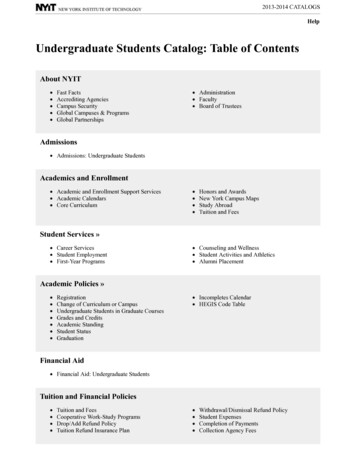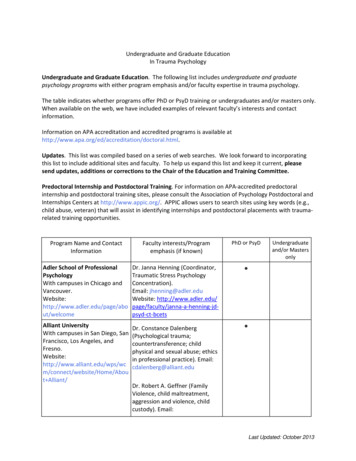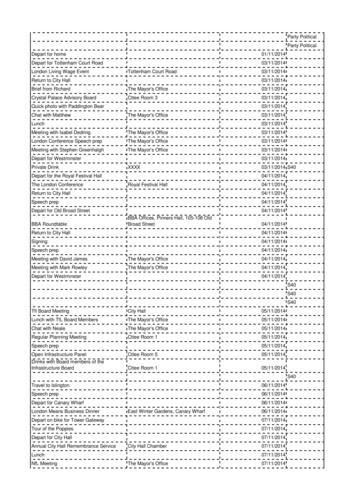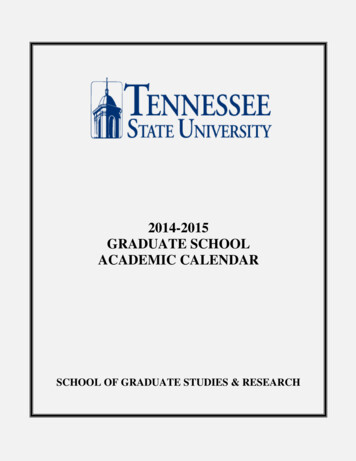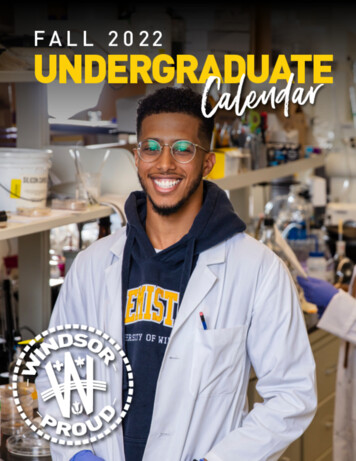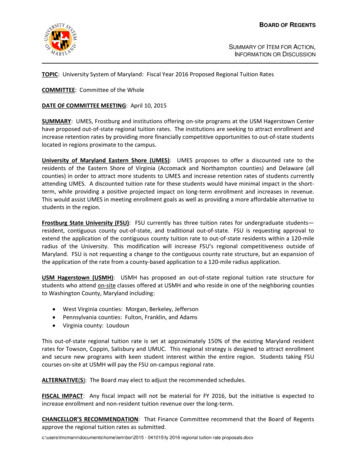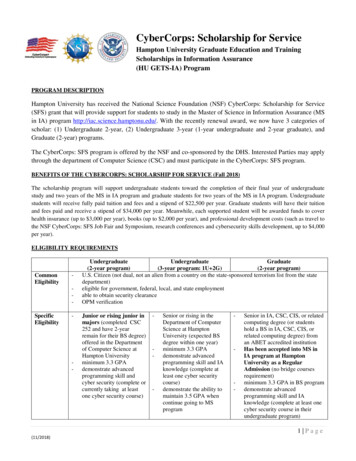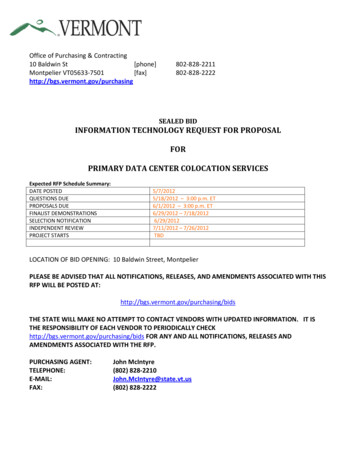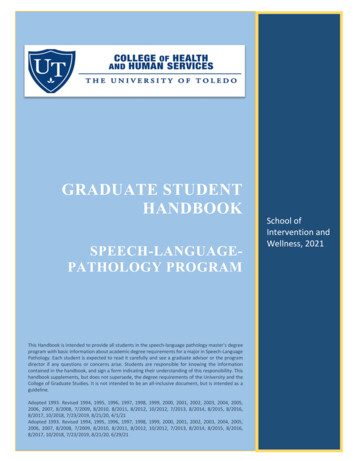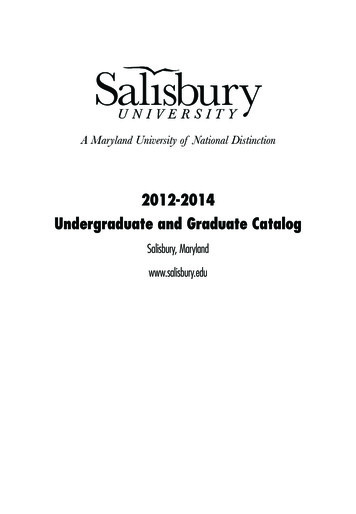
Transcription
A Maryland University of National Distinction2012-2014Undergraduate and Graduate CatalogSalisbury, Marylandwww.salisbury.edu
Table of ContentsGeneral Information .3Campus Map .5The University .6Undergraduate Admission .12Graduate Student Information .16Continuing Education.23University Expenses .24Financial Aid .27Student Life .43Honors and Recognitions .49Undergraduate New Student Experience .54Registration and Student Records.55University Curricula .61Undergraduate Scholastic Standardsand Support Services.67Thomas E. Bellavance Honors Program .72Pre-professional Programs .74Military Science .752Undergraduate Minors .76Charles R. and Martha N. FultonSchool of Liberal Arts .92Richard A. Henson School of Scienceand Technology .134Franklin P. Perdue School of Business .168Samuel W. and Marilyn C. Seidel Schoolof Education and Professional Studies .184Courses .213University System of Maryland .341Administration .342Faculty .349Emeriti .368Appendices .371Index .377Cover Photo by Kathy D. Pusey ’86
General Informationwww.salisbury.edu/aboutMailing AddressSalisbury University1101 Camden AvenueSalisbury, Maryland 21801-6860Specific correspondence should be addressed as follows:Admission .Assistant Vice Presidentfor Enrollment ManagementTranscript of Record .RegistrarBusiness Matters .Vice President of Administrationand FinanceGeneral Matters .Director of Media RelationsGraduate Admission .Assistant Vice Presidentfor Enrollment ManagementSummer Sessions/Winter Term.RegistrarInformation about Salisbury University, including a colorfulphoto tour, is available on the University’s home page at thefollowing Web site: www.salisbury.edu.Telephone Number410-543-6000FAX 410-677-5025TTY 410-543-60831-888-543-0148University CalendarFor the latest, visit www.salisbury.edu/calendar.Catalog NoticeThe purpose of this publication is to provide informationabout Salisbury University to persons who work and study atthe University, to persons who may be interested in applyingfor admission, and to parents, teachers, counselors and thegeneral public. THIS PUBLICATION IS NEITHER ACONTRACT NOR AN OFFER TO MAKE A CONTRACT. Whileevery effort has been made to ensure the accuracy of theinformation in this publication, the University reserves the rightto make changes at any time with respect to course offerings,degree requirements, services provided or any other subjectaddressed in this publication. The information in thispublication is provided solely for the convenience ofthe reader.All changes are implemented so that new curricularrequirements will not work hardships on students who haveentered under an earlier set of requirements. The Schedule ofSemester Course Offerings, available online atwww.salisbury.edu/registrar/course schedules.html, providesthe official list of University course offerings.Family Educational RightsAnd Privacy ActUnder the provisions of the Family Educational Rightsand Privacy Act, Salisbury University publishes studentdirectory information without prior consent of students.Directory information includes a student’s name, local address(if listed), date and place of birth, major fields of study,participation in officially recognized activities and sports, weightand height (of an athletic team member), dates of attendance,degrees and awards received, and most recent previouseducational agency or institution attended, as well as a listingof officers of student organizations (including names andaddresses).Salisbury University does not sell or otherwise providemailing lists of student information to anyone outside of theUniversity. The Registrar’s Office is responsible for compilingand disseminating directory information.Students who want more or less than the directoryinformation listed above to be released without priornotification or consent should contact the Registrar’s Office,Holloway Hall.Equal Opportunity PolicySalisbury University has a strong institutional commitmentto diversity and is an Equal Opportunity/Affirmative Actionemployer, providing equal employment and educationalopportunities to all those qualified, without regard to race,color, religion, national origin, sex, age, marital status, disabilityor sexual orientation. The University adheres to the EEO/AApolicies set forth by federal and state governments. Althoughthe EEO/AA has specific responsibilities to affirmative actionand equal opportunity, each office, student and employee is anessential component in fostering diversity and respect fordifferences.Salisbury University values diversity among its students,faculty and staff and believes that interactions with thoseholding varying perspectives, backgrounds and beliefscontribute to a well-rounded educational experience andpromotes personal and professional development.Understanding and acceptance of others is of ever-increasingimportance in today’s world.The Human Resources (HR) Office oversees the hiringprocesses of new employees and ensures that they arehandled in an equal and fair manner. HR and the FairPractices Officer address complaints of discrimination andwork to resolve these issues.3
General InformationAccreditations/SocietiesSalisbury University has the following accreditations:The University is accredited by the Commission onHigher Education of the Middle States Association of Collegesand Schools, 3624 Market Street, Philadelphia, PA, 19104,267-284-5000. The Commission on Higher Education is aninstitutional accrediting agency recognized by the U.S.Secretary of Education and the Council for Higher EducationAccreditation (CHEA).Two programs in the Department of Chemistry areapproved by the American Chemical Society Committee onProfessional Training, a specialized scientific society foundedin 1876 and recognized though an Act of the U.S. Congressin 1937. The society is located at 1155 16th Street, N.W.,Washington, DC 20036, 202-872-4589.The programs in exercise science is accredited by theCommission on Accreditation of Allied Health EducationPrograms (CAAHEP), a specialized accrediting agencyrecognized by the Council for Higher Education Accreditation.The Committee on Accreditation for the Exercise Sciences(CoAES) serve as an arm of the CAAHEP and reviews allprograms seeking specialized accreditation status in exercisescience. The CAAHEP is located at 1361 Park Street,Clearwater, FL 33756, 727-210-2350.The program in respiratory therapy is accredited by theCommission on Accreditation for Respiratory Care (CoARC).CoARC, formerly a specialized arm of the Commission onAccreditation of Allied Health Education Programs (CAAHEP),became a freestanding accreditor of respiratory care programsas of November 12, 2009. The CoARC is a member of theAccreditation for Specialized and Professional Accreditors(ASPA) and is seeking recognition from the Council for HigherEducation (CHEA), the same organizations that recognizeCAAHEP. CoARC is located at 1248 Harwood Road, Bedford,TX 76021-4244, 817-283-2835.The program in athletic training is accredited by theCommission on Accreditation of Athletic Training Education(CAATE). The CAATE is located at 2201 Double Creek Drive,Suite 5006, Round Rock, TX 78664, 512-733-9700.The social work programs are accredited by the Councilon Social Work Education, a specialized accrediting agencyrecognized by the Council for Higher Education Accreditation.The CSWE is located at 1725 Duke St., Suite 500, Alexandria,VA 22314, 703-683-8080.The degree programs in business are accredited by theAssociation to Advance Collegiate Schools of Business, aspecialized accrediting agency recognized by the Council forHigher Education Accreditation. The AACSB-International islocated at 777 South Harbour Island Boulevard, Suite 750,Tampa, FL, 33602-5730, 813-769-6500.The program in medical laboratory science is accreditedby the National Accrediting Agency for Clinical LaboratorySciences, 5600 N. River Road, Suite 720, Rosemont, IL60018, 773-714-8880. The NAACLS is a specializedaccrediting agency recognized by the Council for HigherEducation Accreditation.The program in environmental health sciences isaccredited by the National Environmental Health Scienceand Protection Accreditation Council, a specializedaccrediting agency. The agency is located at 8620 RooseveltWay, NE, Suite A, Seattle, WA 98115, 206-522-5272.The programs in music are accredited by the NationalAssociation of Schools of Music (NASM), 11250 Roger BaconDrive, Suite 21, Reston, VA 20190, 703-437-0700. NASM is aspecialized accrediting agency recognized by the Council for HigherEducation Accreditation and the U.S. Secretary of Education.4The programs in nursing are accredited by theCommission on Collegiate Nursing Education, One DupontCircle, NW, Suite 530, Washington, D.C. 20036, 202-8876791, and the Maryland Board of Nursing. The CCNE is aspecialized accrediting agency recognized by the Council forHigher Education Accreditation and the U.S. Secretary ofEducation.The programs in teacher education are accredited by theNational Council for Accreditation of Teacher Education(NCATE), 2010 Massachusetts Avenue, NW, Suite 500,Washington, D.C. 20036, 202-466-7496, and the MarylandState Department of Education. The NCATE is a specializedaccrediting agency recognized by the U.S. Secretary ofEducation and the Council for Higher Education Accreditation.DesignationsSalisbury University has the following designations:Maryland State Publications DepositoryServiceman’s Opportunity CollegeU.S. Government Selective Document DepositoryAmerican Association of Botanical Gardens and ArboretaMembershipsSalisbury University is a member of the followingorganizations:American Association for Higher EducationAmerican Association of Colleges of NursingAmerican Association of Colleges for Teacher EducationAmerican Association of State Colleges & UniversitiesAmerican Council on EducationAmerican Educational Research AssociationAssociation for the Advancement of Sustainability inHigher EducationAssociation of American Colleges & UniversitiesAssociation to Advance Collegiate Schools of BusinessCollege BoardCouncil for Advancement and Support of EducationCouncil for Opportunity in EducationCouncil on Social Work EducationEDUCAUSEInternational Association of Counseling ServicesNational Association of Schools of MusicNational Collegiate Athletics AssociationNational Strength and Conditioning AssociationU.S. Green Building CouncilVoluntary System of Accountability (VSA) College PortraitUniversity System of MarylandSalisbury University is a member of the UniversitySystem of Maryland, which is comprised of 11 campuses andtwo research centers.
Campus MapCampus Mapwww.salisbury.edu/campusmap(PDF version also available online)5
The Universitywww.salisbury.edu/aboutDr. Janet Dudley-Eshbach, PresidentMISSIONSalisbury University is a premier comprehensiveMaryland public university, offering excellent, affordableeducation in undergraduate liberal arts, sciences, preprofessional and professional programs, including education,nursing, social work and business, and a limited number ofapplied graduate programs. SU’s highest purpose is toempower its students with the knowledge, skills and corevalues that contribute to active citizenship, gainful employmentand life-long learning in a democratic society andinterdependent world.Salisbury University cultivates and sustains a superiorlearning community where students, faculty and staff engageone another as teachers, scholars and learners, and where acommitment to excellence and an openness to a broad arrayof ideas and perspectives are central to all aspects ofUniversity life. SU’s learning community is student-centered;thus, students and faculty interact in small classroom settings,faculty serve as academic advisors and virtually every studenthas an opportunity to undertake research with a facultymentor. SU fosters an environment where individuals makechoices that lead to a more successful development of social,physical, occupational, emotional and intellectual well being.The University recruits exceptional and diverse faculty,staff, and undergraduate and graduate students from acrossMaryland, the United States and around the world, supportingall members of the University community as they work togetherto achieve the institution’s goals and vision. Believing thatlearning and service are vital components of civic life,Salisbury University actively contributes to the local EasternShore community and the educational, economic, cultural andsocial needs of the state and nation.VALUESThe core values of Salisbury University are excellence,student-centeredness, learning, community, civic engagementand diversity. We believe these values must be lived andexperienced as integral to everyday campus life so thatstudents make the connection between what they learn andhow they live. The goals and objectives of our strategic,academic, facilities and enrollment plans, as well as our fiscalcommitments, reflect our fundamental values. In addition tothese principal values, the University embraces the longhonored tradition of honesty and mutual regard that is andshould be a defining characteristic of higher education. The“Salisbury University Promise” is a statement of integrity andrespect for others to which we ask all students to commit as away of highlighting the University’s values and expectations forour students.6Excellence: Excellence, the standard against which allUniversity activities and outcomes are measured, connotes theperfection and the quality for which we strive and holdourselves accountable. We accept the notion that the quality ofa university depends on the heads and hearts of those in it.Student-Centeredness: Our students are the primaryreason for our existence. Our focus is on their academic andindividual success and on their health and well-being. We arecommitted to helping students learn to make reasoneddecisions and to be accountable for the outcomes of thedecisions they have made.Learning: We believe that learning is fundamental toliving a life with purpose in an increasingly interrelated worldand that our role is to teach students not what to think, but howto think. The University introduces students to a system ofideas about the nature of humanity, the universe, and the worldcreated by art and thought. Through active learning, servicelearning, international experience and co-curricular activities,students connect research to practice, and theory to action.Community: Salisbury University takes pride in being acaring and civil place where individuals accept their obligationsto the group, learn through their interactions and relationshipswith others, where governance is shared, and where the focusis on the common good. We honor the heritage and traditionsof the institution which serve as a foundation for future change.Civic Engagement: The University stands as a part of,rather than apart from, the local and regional community.Recognizing its history and traditions, we seek to improve thequality of life for citizens in the region. We believe it is ourresponsibility to enrich cultural life, enhance the conduct ofpublic affairs and contribute to the advancement of the region.We seek to instill in our students a lifelong commitment tocivic engagement.Diversity: Salisbury University views itself as a justcommunity where there is respect for the value of global,societal and individual differences and commitment to equalopportunity. Diversity is purposefully cultivated as a way tostrengthen and enhance our University community.HISTORYIn 1922, the Maryland Legislature established acommission to determine a location for a two-year college onthe state’s Eastern Shore. A site at Salisbury was selected andthe institution opened in September 1925.The college’s two-year course of study was increased tothree years in 1931 and to four years in 1934. Following this,and by action of the Legislature of 1935, the College wasauthorized to grant the Bachelor of Science.
The UniversityThe academic program expanded in 1947 and in 1960,offering four-year programs in arts and sciences and providingstudents with a Bachelor of Arts or Bachelor of Science. TheUniversity continues to meet the increasing demands ofsociety for quality education and today offers a variety ofundergraduate programs in liberal arts, sciences and in theprofessional fields of business administration, education,medical technology, nursing, respiratory therapy andsocial work.In 1962, the State Board of Trustees approved agraduate program leading to the Master of Education, followedwith a Master of Arts in English (1974), a Master of BusinessAdministration (1981), a Master of Science with a major innursing (1982). The Board of Regents for the UniversitySystem of Maryland has subsequently approved a Master ofEducation with a major in public school administration (1994),a Master of Arts in Teaching (1996), a Master of Arts with amajor in history (1998), a Master of Science in applied healthphysiology (2000), a Master of Social Work (2001), a Master ofScience with a major in geographic information systems (GIS)and public administration (2007), and a Master of Arts inconflict analysis and dispute resolution (2007).Today, Salisbury University is a nationally accredited,four-year comprehensive university offering 55 distinctundergraduate and graduate degree programs in a friendlyatmosphere that encourages close relationships betweenfaculty and students.LOCATIONSalisbury University is located on U.S. Route 13 at thesouthern edge of Salisbury, MD, which has a metropolitanpopulation of over 90,000 and is 30 miles west of Ocean City,MD; 115 miles southeast of Baltimore, MD, and Washington,D.C.; 125 miles south of Philadelphia, PA; and 125 miles northof Norfolk, VA.ORGANIZATIONResponsibility for the administration of the University isassigned to the president, who is appointed by the UniversitySystem of Maryland Board of Regents. The president isassisted in the administration of the University by academic,advancement, business administration and student servicesadministrators. Appointments to these positions, to otheradministrative offices and to the faculty and staff of theUniversity are made by the president.The Franklin P. Perdue School of Business, the SamuelW. and Marilyn C. Seidel School of Education and ProfessionalStudies, the Charles R. and Martha N. Fulton School of LiberalArts and the Richard A. Henson School of Science andTechnology offer the University’s curriculum. School deans,department chairs and individual faculty members report to theprovost in all matters pertaining to instruction.The Franklin P. Perdue School of Business includes thefaculties of accounting and legal studies, economics andfinance, information and decision sciences, and managementand marketing.The Samuel W. and Marilyn C. Seidel School ofEducation and Professional Studies includes the faculties ofathletic training, early childhood education, elementaryeducation, exercise science, health education, physicaleducation and social work.The Charles R. and Martha N. Fulton School of LiberalArts includes the faculties of art, communication arts, conflictanalysis and dispute resolution, dance, English, environmentalissues, history, interdisciplinary studies, international studies,modern languages (French, German, Spanish), music,philosophy, political science, psychology, sociology, teachingEnglish to speakers of other languages (TESOL) and theatre.The Richard A. Henson School of Science andTechnology includes the faculties of applied health physiology,biological sciences, chemistry, medical laboratory science,geography and geosciences, mathematics and computersciences, nursing, physics and respiratory therapy.CENTERS AND INSTITUTESBusiness, Economic and Community OutreachNetwork (BEACON)The Business, Economic and Community OutreachNetwork (BEACON) of the Franklin P. Perdue School ofBusiness combines applied business learning experiences forSU students with sponsored research and consulting servicesto non-profit, private and public-sector organizationsthroughout the Delmarva region.Student teams, supervised by faculty and BEACONconsultants, work on projects such as market or sales-demandforecasting, marketing audits and plans, feasibility studies,economic impact assessments, international marketingreadiness assessment and planning, business or economicscenario analysis modeling, and strategic planning, Asstudents apply what they learn in the classroom to theseprojects, they gain valuable real-world experiences.BEACON, as part of its outreach and technology transfermandates, is also involved with a variety of intellectualproperty commercialization projects.Key BEACON initiatives include: ShoreTrends—tracking demographic, business, economic,workforce and community development trends throughout theEastern Shore of Maryland. GraySHORE and ShoreWISDOM—preparing the region’sprivate and public sector organizations for the coming seniorboom throughout the Shore. Bienvenidos â Delmarva—providing management,marketing and organizational development know-howto private- and public-sector organizations thatinteract frequently with the region’s rapidly growingnon-native-born population. Executive Career Mentoring Program—bringing togethersenior decision-makers from BEACON client organizationsand graduating M.B.A. students for one-on-onementoring sessions.In addition, BEACON is a proud sponsor ofShoreENERGY, which promotes a community-wide dialog toaddress the multitude of current and future regional energyneeds and potential solutions.For more information, contact BEACON at 410-546-6001,e-mail beacon@salisbury.edu or visit http://beacon.salisbury.edu.7
The UniversityCenter for Conflict ResolutionThe Center for Conflict Resolution works in cooperationwith the Conflict Analysis and Dispute Resolution Departmentto provide experiential learning opportunities to students in theUniversity’s academic major, minor and master’s in conflictanalysis and dispute resolution. Students take practicum andinternships through the center at locations both on and offcampus. The center houses the student-run CampusMediation Center that provides conflict resolution services tothe student body. The center also provides support and use ofits facilities to the Conflict Resolution Club. In addition, thecenter has a research and evaluation wing that has receivednational recognition. The practice wing is composed ofnationally recognized experts who work with center staff onlarge-scale conflict interventions worldwide. The center has aCommunity Mediation Initiative that provides the Salisburycommunity with free or low-cost mediation services andtrainings in conflict resolution skills. Also housed in the centeris the Bosserman Library, a private, non-lending librarystudents and practitioners can examine, containing literatureon social justice, peace studies and conflict resolution.Eastern Shore Regional GIS CooperativeThe Eastern Shore Regional GIS Cooperative (ESRGC)is an organization that seeks to provide access to geographicinformation system (GIS) technology, data, technical supportand training to the local governments of Maryland’s EasternShore. Housed at Salisbury University, the ESRGC is a jointeffort between the Mid-Shore Regional Council, the Tri-CountyCouncil of the Lower Eastern Shore of Maryland and SU.Nabb Research Center for Delmarva Historyand CultureThe Edward H. Nabb Research Center for DelmarvaHistory and Culture, formed in 1982 and endowed byCambridge, MD, attorney and philanthropist Edward H. Nabbin 1998, is dedicated to preserving the uniqueness of thehistory and culture of the Delmarva Peninsula. Each semesterprofessors in the Communication Arts, English, Geography andGeosciences, History, and Teacher Education departmentsprovide courses which train students in the use of primaryresources such as wills, inventories, patents and deeds,private papers, letters, diaries, business records, oral historiesand folklife studies located at the center. It is a repository fordocuments and artifacts pertaining to the Delmarva Peninsulaand acts as a liaison between the University and the LowerEastern Shore region. The center serves the Delmarvacommunity at large, as well as family and local historyresearchers from across the nation, professional businesspeople including lawyers, surveyors and journalists, studentsand scholars researching material for doctoral dissertations,master’s degree theses, school projects and privatepublications. The Nabb Research Center is located in the EastCampus Complex and is open following the school calendar.Visit http://nabbhistory.salisbury.edu for more information aboutthe center.PACEFor over a decade, the Institute for Public Affairs andCivic Engagement (PACE) has offered opportunities for SUstudents and faculty to become involved in the political andgovernmental life of the surrounding region. With major funding8gifts from the Grayce B. Kerr Fund, the estate of John R.Hargreaves and the Wilson H. Elkins Professorship, PACEsponsors the Presidential Citizen Scholar Program, internshipswith local governments and non-profit organizations; projectsthat involve students in addressing local and regionalgovernmental concerns; numerous lectures with federal, stateand local politicians and academic scholars; and public policyforums and lectures.4Presidential Citizen Scholar ProgramThe Presidential Citizen Scholar Program is a multifaceted, civic engagement experience that prepares studentsto become future community leaders. Students spend one yearimmersed in civic and political engagement activities, includingcoursework and internships. They also attend numerouscampus lectures, forums and community events. The programis by SU presidential invitation only. Students who are invitedto apply submit their application to PACE for review.4InternshipsWorking in conjunction with the Political ScienceDepartment, all SU students have the opportunity to intern foracademic credit with the Maryland General Assembly, theUnited States Congress, and other various federal, state andlocal governmental organizations. Students also have theopportunity to work with non-profits, civic action organizationsor law practices.4Events and ActivitiesPACE actively sponsors and coordinates on-campusevents with federal, state and local politicians, as well asauthors, journalists and other speakers to educate the campuscommunity on public policy topics. PACE also hosts the annualConstitution Day celebration on campus. PACE is responsiblefor coordinating and administering a voter registration drive oncampus during each major election cycle and is often calledupon to assist in moderating candidate debates in localelections. PACE houses the Institute for Service Learning,which conducts civic engagement events and opportunities forthe surrounding communities.Small Business Development CenterThe Small Business Development Center (SBDC) is ajoint federal (Small Business Administration) and state programand is part of a national network of centers. The SBDCEastern Region is an outreach program of the Franklin P.Perdue School of Business, serving as a link between theUniversity and the business community. It provides cost-freeexpert counseling , technical assistance and low-cost trainingto existing small businesses and individuals interested instarting a new business. The SBDC-Eastern Region serves alleight counties of Maryland’s Eastern Shore and helpshundreds of entrepreneurs annually through its offices in WyeMills, Cambridge and Salisbury.ALUMNI ASSOCIATIONThe Alumni Association maintains ties with 38,000 alumniin all 50 states and several foreign countries. Many of thesealumni are vigorous supporters of the University through theassociation.The association’s objectives are to develop and foster anabiding loyalty for Salisbury University, to promote aprofessional and ethical spirit that will characterize SU’s alumnimembers, to encourage participation in all activities that
The Universitypertain to the betterment and growth of the University, and tounite Salisbury graduates and undergraduates.The Office of Alumni Relations and Annu
accrediting agency. The agency is located at 8620 Roosevelt Way, NE, Suite A, Seattle, WA 98115, 206-522-5272. The programs in music are accredited by the National Association of Schools of Music (NASM), 11250 Roger Bacon Drive, Suite 21, Reston, VA 20190, 703-437-0700. NASM is a specialized accrediting agency recognized by the Council for Higher
